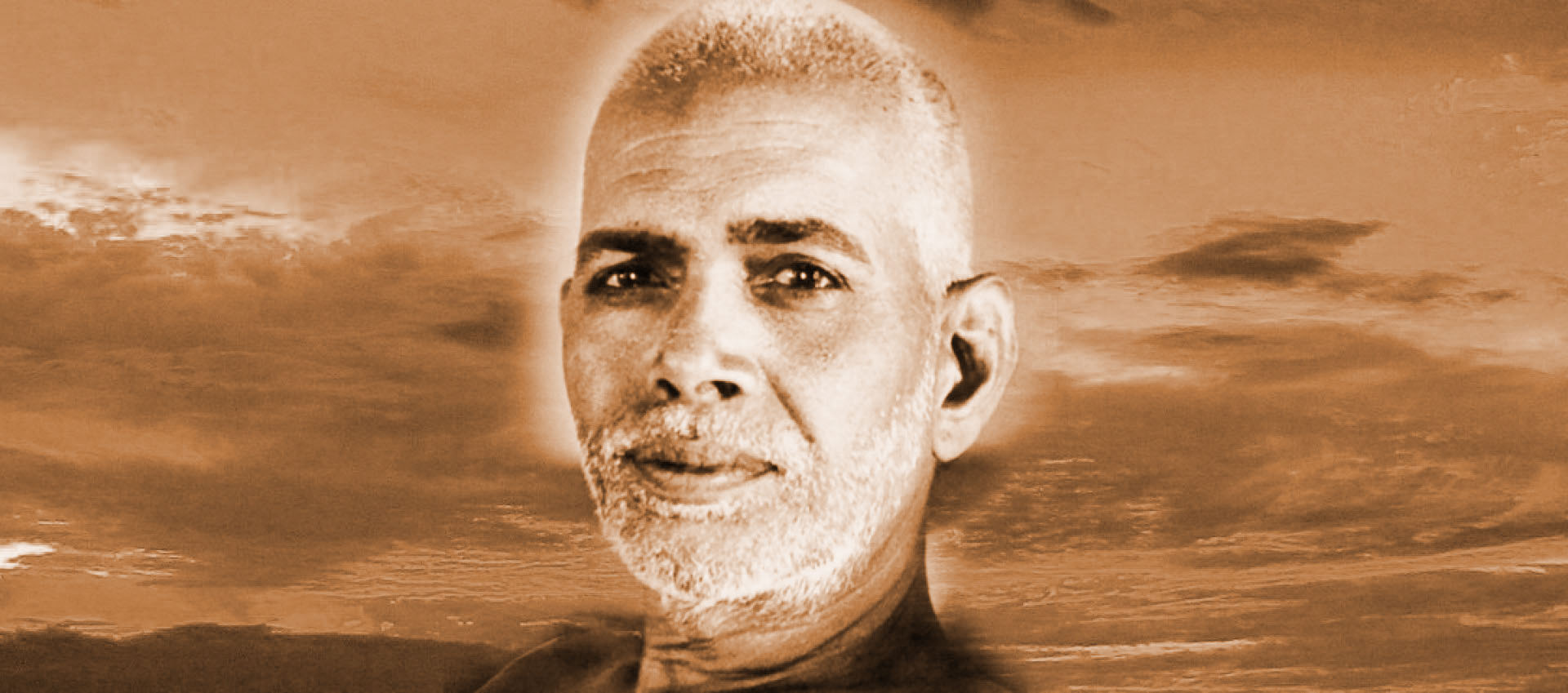
Upadesa Saaram Verses 21 to 30
Upadesa Saaram (Essence of Teachings)
Wonderful Teachings of Sri Ramana Maharshi
Sanskrit Verses and English Translation
Sanskrit Verses and English Translation
The Genesis of Upadesa Saaram
There is an old legend that a group of Rishis once lived in the forest together, practising Vedic rituals by which they acquired supernatural powers. By the same means they hoped to attain final Liberation. However, in this they were mistaken, for action can only result in action; rituals can produce powers, but not the Peace of Liberation which is beyond rituals and powers and all forms of action. The Rishis then realised that they were up against one more powerful than themselves and they bowed down to him for instruction. He then explained to them that it is not by action but by renunciation of action that one is Liberated.
The poet Muruganar was writing this legend in Tamil verse, but when he came to the instruction given to the Rishis by Shiva he asked Bhagavan, who was Shiva Incarnate, to write it for him. Bhagavan accordingly wrote the instruction in thirty Tamil verses (the 30th verse was composed by Muruganar). Ramana himself later translated these into Sanskrit, and the Sanskrit version was daily chanted before Him together with the Vedas, and continues to be chanted before His shrine; that is to say that it is treated as a Scripture. He refers to the various paths to Liberation, grading them in order of efficiency and excellence, and showing that the best is Self-Enquiry.
21
इदमहंपदाभिख्यमन्वहम |
अहमिलीनकेप्यलयसत्तया ||
idamaham padā’bhikhya-manvaham
aham-ilīnake’pyalaya sattyā
This is eternally the true import
Of the term ’I’. For in the deepest sleep
We do not cease to be. We still exist
Even though here there is no sense of ’I’.
22
विग्रहेन्द्रियप्राणधीतामः |
नाहमेकसत्तज्जडम ह्यसत ||
vigrah-endriya prāṇa-dhītamaḥ
nāhameka-sat tajjaḍam hyasat
As I am pure Existence, I am not
The body nor the senses, mind nor life,
Nor even ignorance, for all these things
Are quite insentient and so unreal.
23
सत्वभासिका चित्कवावेतरा |
सत्तयाहिचिच्चिताया ह्याहम ||
sattva-bhāsika citkva vetarā
sattyā hi cit cittayā hyaham
As there is not a second consciousness
To know Existence, it must follow that
Existence is itself that consciousness;
So I myself am that same consciousness.
24
ईशाजीवयोर्वेशाधीभिदा |
सत्स्वभावतो वस्तु केवलं ||
īśa-jīvayor veṣa-dhī-bhidā
sat-svabhāvato vastu kevalam
In their real nature as Existence both
Creatures and the Creator are the same,
The Unique Principle. In attributes
And knowledge only is a difference found.
25
वेषहानतः स्वात्मदर्शनम |
ईशदर्शनम स्वात्मरूपतः ||
veṣa-hānataḥ svātma-darśanam
īśa-darśanaṃ svātma-rūpataḥ
Realization of the Self alone,
Eliminating all its attributes;
Is God-Realization of a truth,
As it is He that shines forth as the Self.
26
आत्मसंस्थितिः स्वात्मदर्शनम |
आत्मनिर्द्वयादात्मनिष्ठता ||
ātma-saṃsthitiḥ svātma-darśanam
ātma-nirdvayād ātma-niṣṭhatā
To be the Self that is to know the Self,
As there is no duality in Self.
This is Thanmaya-Nistha, or the state
Of absolutely being That in truth.
27
ज्ञानवर्जिताज्ञानहीनचित |
ज्ञानमस्ति किं ज्ञातुमंतरम ||
jñāna-varjitā-jñana-hina cit
jñānam-asti kiṃ jñātum-antaram
That knowledge is true knowledge which transcends
Knowledge and ignorance both equally.
And this alone is truth. For there is no
Subject or object there that can be known.
28
किं स्वरूपमित्यात्मदर्शने |
अव्ययाभावापूर्नाचित्सुखम ||
kiṃ svarūpamit-yātma darśane
avyayābhavā” pūrṇa-cit sukham
If one can only realize at Heart
What one’s true nature is, one then will find
That ’tis Infinite Wisdom, Truth and Bliss,
Without beginning and without an end.
29
बन्धमुक्त्यातीतम परं सुखं |
विन्दतीह जीवस्तु दैविकः ||
bandha muktyatītaṃ paraṃ sukham
vindatīhajī vastu daivikaḥ
Remaining in this state of Supreme Bliss,
Devoid of bondage and of freedom too,
Is found to be a state in which one is
Rapt in perpetual service of the Lord.
30
अहमपेतकं निजविभानकम |
महदिदंतपो रमणवागियम ||
aham-apetakaṃ nija-vibhānakam
mahadidaṃ tapo ramaṇa vāgiyam
By ardent quest and shedding ego’s veil
Realize the Self, the One that’s ego-less,
And function thus; the sole right penance this.
So teaches Bhagavan Sri Ramana,
Who is the SELF of everything that is.

